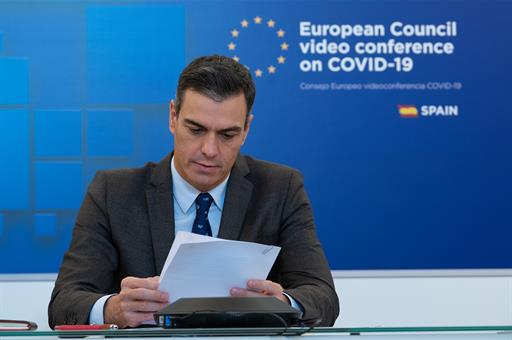President of the Government attends informal European Council on COVID-19
Pedro Sánchez pushes for greater EU coordination on testing and vaccines
President's News - 2020.11.19
Moncloa Palace, Madrid
This informal European Council tackled key issues in combating the pandemic, such as the recognition of rapid antigen tests and vaccines. European leaders also spent time reflecting on what action to take over the coming months.
As regards the rapid tests or antigen tests, the President of the Government underlined the need to establish a mutual recognition mechanism for them so their use can become widespread. Pedro Sánchez explained that antigen tests are showing themselves to be useful in many parts of Spain, as they form part of the country's "strategy for the rapid detection, monitoring and control of COVID-19". However, on the matter of international travel, PCR tests continue to be the most reliable option for the Government of Spain until those antigen tests are made standard across Europe.
As regards the vaccines, President of the Government Pedro Sánchez explained that Spain has already defined its National Vaccination Strategy while it awaits a conclusion of negotiations by the European Commission with suppliers. He also supports its plans to establish distribution criteria based on equality, depending on the population of each Member State, the list of priority groups and other logistics needs.
The President of the Government also highlighted the need to look forward and coordinate the de-escalation of current restrictions across Europe in order to avoid a third wave of the pandemic, especially as Christmas approaches.
The 27 also discussed the delays in approving the Multi-annual Financial Framework and the European Recovery Fund, the so-called "Next Generation EU". Pedro Sánchez called for these to be approved as soon as possible and the funds to become available as soon as possible in early 2021 to start tackling the socio-economic consequences of the pandemic.
Non official translation





